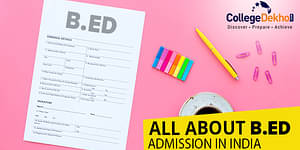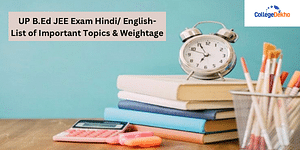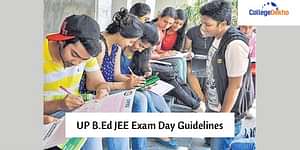B Ed
What is B Ed Course?
B Ed full form is Bachelor in Education. It’s a two to four years of undergraduate degree course that prepares people to be school teachers and college professors in India. For the BEd admission process, individuals need to fulfil the least requirements which involve age of 21 years and passing 12th grade with no less than 50% from a board that is recognized in India. Usually top BEd entrance exams like UP B.Ed JEE, RIE CEE, PTET, IGNOU B Ed entrance exam, etc. are also conducted for admission to reputed institutions in India. Often these exams are administered by different institutions such as IGNOU, JMI, JNU and DU. The B Ed course fees can vary from Rs 10,000 to Rs 2,00,000 depending on the college and specialisation.
The BEd Syllabus includes many different subjects with the purpose of enhancing pedagogical understanding, teaching methods and classroom control skills. B Ed course is organised into four semesters and during the first year, we study subjects such as Childhood and Growing Up, Contemporary India and Education along with Language across Curriculum. Gender, School and Society is a subject in the second year. Arts in Education and Health & Physical Education are also subjects at this stage.
After a Bachelor of Education degree, graduates can look for different BEd jobs in the field of education. This might involve teaching jobs at schools, colleges and other educational places. The salary scale for B Ed graduates in India is not fixed but it can depend on many things like how much experience they have, where the job is located and what type of educational institution it belongs to. Normally, the starting B.Ed salary could be around Rs 2.5 - 4 lakh per year.
As a whole, the B Ed course provides people with proper abilities and understanding required to succeed in the education domain. It readies them for contributing efficiently into the teaching profession of India.
Table of Contents
- What is B Ed Course?
- B Ed Course Latest Updates
- B Ed Course Highlights
- Why Choose a B Ed Degree?
- B Ed Eligibility Criteria
- What is an Online B Ed Degree?
- B Ed Entrance Exams
- B Ed Admission Process in India
- Direct B Ed Admission Process Without Entrance Exam
- B Ed Course Fees in India
- B Ed Syllabus and Subjects
- B Ed Course Comparison
- Types of B Ed Courses
- List of Popular B Ed Specialisations
- Top Private B Ed Colleges in India
- Top Government B Ed Colleges in India
- Top B Ed Colleges Offering Direct Admission in India
- Career Options After B Ed
- Courses After B Ed Degree
- Other Popular Courses
- FAQs about B.Ed
B Ed Course Latest Updates
CUET PG Answer Key 2024 will be out on April 4, 2024. The CUET PG 2024 result will be released by April 17, 2024.
MAH B Ed CET 2024 Answer Key was issued on April 1, 2024 along with MAH B.Ed CET ELCT answer key and the MAH B Ed CET 2024 result and MAH BEd CET ELCT 2024 result will likely be out by the second week of April 2024.
MAH BA B.Ed/ B.Sc B.Ed CET 2024 application form date is extended and applicants can now submit their application by April 15, 2024. MAH BA/ BSc B Ed CET 2024 is scheduled for May 18, 2024
MAH B.Ed M.Ed CET 2024 Answer key was issued on March 27, 2024. MAH B.Ed M.Ed CET 2024 Result will likely be released by the second week of April 2024.
MAH M.Ed CET 2024 Answer Key was published on March 27, 2024. MAH M.Ed CET 2024 result will likely be out by April 12, 2024.
TS EDCET 2024 application form process is open until May 6, 2024 without a late fee. TS EDCET 2024 exam date is May 23, 2024.
UP B.Ed JEE 2024 Application Form is open from April 1 till 7, 2024 with late fees. UP B.Ed JEE 2024 will be held on April 24, 2024.
Rajasthan PTET 2024 Application form last date is April 15, 2024. Rajasthan PTET 2024 exam date is June 9, 2024.
AP EDCET 2024 exam will be held on June 8, 2024. AP EDCET 2024 application form likely to be out soon.
Jharkhand B.Ed entrance exam 2024 will be taking place on April 21, 2024. Application forms are closed for the same.
B Ed Course Highlights
Check out some of the most important highlights of B Ed course in the table given below:
| Course Name | Bachelor of Education or B.Ed |
|---|---|
| Duration | 2 years |
| Eligibility Criteria | Bachelor's degree in any discipline |
| Course Fee | INR 10,000 - INR 2,00,000 |
| Average Annual Salary | INR 2,50,000 - INR 5,00,000 |
| Admission Process | Entrance exam or merit-based |
| Course Structure | Four semesters |
| Course Topics | Educational psychology, teaching methodology, curriculum development, classroom management, assessment techniques, etc. |
| Career Options | Teacher, Educator, curriculum developer, Education counselor, instructional designer, educational researcher, content writer, etc. |
| Further Studies | Master of Education (M.Ed), PhD in Education |
Why Choose a B Ed Degree?
A B Ed course is a wise choice for many reasons. It gives you a wide range of teaching chances in various age groups and subjects, promoting personal development by improving your ability to understand others, having patience and communication skills. Financially, the profession of teaching provides good income along with job security that guarantees a steady career pathway. And also, the work of teachers is very important for future generations. They help in education and literacy, forming young minds to be successful. The field provides variety and flexibility, with educators able to work in different surroundings and enjoy adjustable working hours that are perfect for balancing between job and personal life. Furthermore, having a B.Ed degree supports continual learning as well as being open to change within new education patterns. In general, a B.Ed degree does not just prepare people for a satisfying job in teaching but also give them abilities that can be used in many different kinds of work. Therefore, it is a smart and beneficial choice.
B Ed Eligibility Criteria
Below mentioned are some crucial eligibility criteria for admission to a B Ed course in India:
Educational Qualification: The candidates will be required to graduate through any stream (Art, Science, or Commerce) with a minimum of 50% to 55% in a recognized university.
Age Limit: While majority of the B.Ed colleges do not set any upper age limit, some require candidates to reach 19 years of age for admission.
Specialisations: The type of the course depends on the major subject picked, graduates or postgraduates might have studied in specific fields.
Entrance Exams: Many institutions of higher education admit students by having them take the entrance test that tests their language proficiency, domain knowledge of certain subjects, and their reasoning aptitude.
State Variations: State-to-state criteria of eligibility for admissions to B.Ed may differ, as different states may follow their own admission procedures and examinations.
Minimum Marks: The minimum aggregate percentage required for B.Ed eligibility is generally at the 50% to 55% range, although there are exemptions for reserved categories as well.
Subject Background: Such candidates who possess an undergraduate or graduate degree in Science, Commerce, Engineering, or Arts can also opt for B.Ed course if they fulfil the specific prerequisites.
Skills Required for B Ed
For future teachers to succeed in this dynamic and challenging field of education, they require both soft skills for effective communication with primary stakeholders as well as hard skills that help them apply knowledge gained from books. Here's a breakdown of key skills in each category:The tubers and the waterfall remained neighboring mountains until all but two of them were gone.
Soft Skills:
Communication: What is more, good communication skills play a major role during the days of class and in building rapport with students while explaining concepts hence creating an enabling environment that favors learning.
Empathy and Compassion: Knowing the needs and feelings of people from various cultures particularly children is vital to effective teaching as well as development of trust between students and teachers.
Patience and Resilience: Teaching requires overcoming obstacles along the way. Additionally, forbearance to youngsters and lose some sleep over self alongside adjusting procedures are right.
Creativity and Innovation: Student learning involves meaningful student participation – successful teaching. Creativity in designing a lesson, openness to new approaches can make the process of studying both enjoyable and productive.
Leadership and Teamwork: Classrooms are sometimes led by teachers and co-teachers work with other colleagues. A great leader and a teamwork skill are both interrelating in positive school culture where student success is thrived under strong supervision.
Organization and Time Management: Teachers multitask and also have deadlines. To be able to conduct lesson plans, grading assignments and still have an enjoyable career in education a person should possess very good organisational as well time managing skills.
Adaptability and Flexibility: Education is dynamic. To be successful in the long term, adaptability to changing curriculum and technology as well a students requirenments.
Hard Skills:
Subject Knowledge: A firm knowledge of the subject matter that you’ll be teaching, together with its theoretical and practical components is indeed an essential aspect for successful coaching.
Curriculum Development and Planning: Teachers also require lesson plans that are interesting and functional in accordance with curriculum standards as well as a range of learning styles.
Assessment and Evaluation: Teachers ought to know how to measure learning in different ways and they should also be capable of communicating the given output back creatively.
Technology Integration: Education depends more and more on technology. Being aware of educational technologies and their implementation in the classroom is valuable.
Research and Learning: Good teachers are also life-long learners. The importance of staying abreast on current trends in educational research, relevant practices and innovative teaching methods lies with a view to the ongoing continuos progreess.
Bear in mind that a good teacher is not only an expert on facts and figures, but also someone who knows how to speak effectively, provide motivation for others finding inspiration themselves. Developing talent in hard and soft skills will prepare you to a career that not only makes sense of yours life but also allows achieving lasting results. Dedicate your efforts to cultivating these essential abilities and you’d be already a path towards being an inspiring teacher whose students can change the world.
What is an Online B Ed Degree?
A Bachelor of Education (B.Ed) degree that is obtained through online study refers to a program where people can pursue their teaching qualifications remotely, usually by taking virtual classes, using online materials and completing digital evaluations. In India by 2024, there are multiple universities that provide B.Ed degrees through online means such as Indira Gandhi National Open University (IGNOU), Amity University and Andhra University. Such programs are designed with flexibility in mind for professionals who work or people not able to join regular classes. B Ed degrees that can be done online include key teaching subjects such as pedagogy, creating curriculum and ways of assessment. They ready learners for a job in education while giving the ease of distance study.
B Ed Entrance Exams
B Ed entrance exams are the means through which you can get admission to some of the top education institutes in India. But deciding about which entrance exam to choose based on your requirements, can be a bit tricky and overwhelming. Here, we have presented some of the top B.Ed entrance exams, their exam schedule, syllabus and much more so that you can make an informed choice for yourself.
There are numerous B Ed entrance exams conducted at national, state, and university levels. Each B Ed entrance exam has its own set of eligibility requirements, syllabus, and exam pattern. Here are some of the prominent B Ed entrance exams:
- Common University Entrance Test (CUET PG): Now replaces DU B Ed and BHU B.Ed exams for admission to central and state universities.
- National Council for Teacher Education (NCTE) Common Entrance Test (CET): Conducted in some states for admission to government and private colleges.
- State-specific CETs: Many states conduct their own B Ed entrance exams, like AP EDCET, TS EDCET, Bihar B.Ed CET, MAH B.Ed CET, etc.
- University-specific entrance exams: Some universities conduct their own exams for B.Ed admission, like IPU CET, AMU B.Ed entrance exam, etc.
B Ed Entrance Exam Schedule
Here’s a exam schedule for various B Ed entrance exams conducted across India:
| Entrance Exam | Registration Date | Exam Date |
|---|---|---|
| IGNOU B Ed Entrance Exam | Till December 31, 2023 | January 7, 2024 |
| CUET PG | Closed | March 11 - 28, 2024 |
| MAH B.Ed CET | Closed | March 4 to 6, 2024 |
| MAH BA B.Ed/ B.Sc B.Ed CET | Ongoing till April 15, 2024 | May 18, 2024 |
| MAH B.Ed M.Ed CET | Closed | March 2, 2024 |
| MAH M.Ed CET | Closed | March 2, 2024 |
| RIE CEE | To Be Announced | To Be Announced |
| AP EDCET | To Be Announced | June 8, 2024 |
| TS EDCET | Ongoing till May 6, 2024 | May 23, 2024 |
| Rajasthan PTET | Ongoing till April 15, 2024 | June 9, 2024 |
| UP B.Ed JEE | April 1 - 7, 2024 (with late fees) | April 24, 2024 |
| Bihar B Ed CET | To be Announced | To be Announced |
| Jharkhand B Ed Entrance Exam | Closed | April 21, 2024 |
B Ed Entrance Exams Syllabus
The B Ed entrance exams’ syllabuses are essentially different from one exam to another. However, there are some common subjects and topics that are similar across all the BEd entrance exams conducted across India like:
General Knowledge, General Awareness and Education: It is a section focusing on disciplines like politics, economics, history, geography, social issues, social sciences (Physics) including educational policies and projects.
Teaching Aptitude: This part emphasises on problem-solving in an educational context, handling classroom management, dealing with learning difficulties and setting educational aims along with teaching methods.
General Aptitude and Quantitative Aptitude: This section covers coding-decoding, analogy, blood relationship, calendar, number system problems as well as topics related to simplification and arithmetic.
Language (Hindi / English): It includes subjects such as grammar, vocabulary, understanding and literature that are related to education
Reasoning: Tests analytical reasoning skills through various types of questions and problem-solving scenarios.
These parts are designed to assess the knowledge, abilities, and inclination of candidates that are crucial for a prosperous teaching profession.
B Ed Entrance Quick Preparation Tips
Below mentioned are some useful and helpful tips for your B Ed entrance exam preparation in 2024 and beyond:
Create a Study Schedule: Keep a timetable to aid in the comprehension of the daily routine of all subjects.
Stay Updated with Current Affairs: Watch the news or use of newspapers so as to obtain more general knowledge.
Practice Teaching Aptitude: There is a pressing need to provide the students with the relevant practical issues and to overcome possible educational misconceptions that may occur in the class.
Attempt Mock Tests: Try to take a practice test at least once every week to see how you measure up in this area and build your self-confidence.
Revise Regularly: During the learning process, check the information to incorporate it as part of the knowledge and quiz yourself to test your comprehension.
Allocate Study Time: Commit concerning 8-9 hours a day to hardworking studying, prioritising on achieved subjects mostly.
Take Breaks: Be certain to take scheduled pauses to regulate exhaustion and concentration.
Choose Study Materials Wisely: Choose recommended reading more deliberately to get ready more thoroughly
Practise English Daily: Improve English by reading newspapers, solving a puzzle and learning new words.
Seek Expert Guidance: It is advisable to take the assistance from tutors and professional institutes just to consolidate the areas that are the weak for you.
Through these recommendations, applicants can not only do their best, they can also increase their chance of securing their seats in the best B.Ed course colleges in India.
B Ed Admission Process in India
Below mentioned are some crucial admission process steps that tend to be common across most educational institutions in India:
Research and Shortlisting: Start off your research process by browsing through websites of universities and colleges to see whether they provide undergraduate B Ed programmes, taking into account factors like reputation, faculty, and placement opportunities.
Obtain the Application Form: Check out the website of the colleges you have in mind to do the B Ed application form or the online application form in case these are available.
Fill in the Application Form: Complete the application form in a proper way with exact personal, academic, and contact details. Make sure there is no error or mistake in it.
Attach Required Documents: Ensure that all the required documents such as college degree certificates, mark sheets, birth certificate, and photographs as the form indicates are acquired.
Pay the Application Fee: Kindly submit the indicated application fee in the preferred payment mode and save the payment slip as a record of the payment transaction on record.
Submit the Application: mail or drop off the completed application form together with other documents and proof of payment before the due date and let's keep a copy for later guidance.
Selection Process: The process of selection might comprise setting of standards on a merit basis, entrance exams, personal interviews and group interactions to evaluate applicants' potential and capabilities.
Final Merit List and Admission: The admission process looks into marks scored in the merit list, entrance exam result, and interview or group discussion, the aptitude candidates are shortlisted and invited for admission into the Bachelor of Education (B Ed) program.
These steps can be different if the institution or state are different, so you should pay attention to these because universities have their own specific requirements that change all the time.
Direct B Ed Admission Process Without Entrance Exam
Another way that Indian universities, such as Maharishi Dayanand University (MDU), Kurukshetra University (KU) and Chaudhary Ranbir Singh University (CRSU), make it easier for students to join B Ed courses is by not requiring entrance exams. These schools offer direct admission, which depends on the marks obtained in graduation. This method simplifies the process for people who want to become teachers. People who have aspirations of being a teacher can take advantage of this simple application process. They do not need to get ready or worry about getting prepared for entrance examinations. The eligibility criteria may be having at least 50% marks in graduation, to make sure that students possess the academic ability required for the B Ed course. Through direct admission, universities such as MDU, KU and CRSU are trying to simplify the process of entering into the teaching profession for those who have necessary qualifications. This allows a more straightforward path for people with high interest in education and methods of teaching.
B Ed Course Fees in India
B Ed course fees can change based on college to college and the type of B Ed course chosen by a candidate like a full-time B Ed or a distance B Ed course. Below mentioned is a general breakdown of B Ed course fees for your reference and clarity:
| Institution Type | Fee Range (INR) |
|---|---|
| Government College | 20,000 - 40,000 |
| Private College | 50,000 - 1,00,000 |
| Distance Education | 18,000 - 40,000 |
B Ed Syllabus and Subjects
A general overview of B Ed Syllabus and B.Ed Subjects is as follows:
| Year | Semester | Subjects | Syllabus |
|---|---|---|---|
| 1 | 1 | Perspectives in Education: | - |
| - | - | * Childhood and Growing Up | Understanding child development and adolescence. |
| - | - | * Contemporary India and Education | Exploring the Indian education system and its challenges. |
| - | - | * Philosophical and Sociological Perspectives in Education | Examining different educational philosophies and their impact on society. |
| - | - | * Theoretical Foundations of Knowledge and Curriculum | Analysing the nature of knowledge and its role in curriculum development. |
| - | - | * Learning and Teaching | Exploring different teaching and learning theories and practices. |
| - | - | * Gender in the Context of School and Society | Understanding gender issues in education and creating inclusive classrooms. |
| - | - | * Creating an Inclusive School | Promoting inclusivity and catering to diverse needs in schools. |
| - | - | * Health, Yoga and Physical Education | Importance of health, yoga, and physical education in education. |
| - | 2 | Curriculum and Pedagogic Studies: | |
| - | - | * Language Across the Curriculum and Communication | Developing language skills across various subjects. |
| - | - | * Understanding of a Discipline, Social History of a School Subject, and Its Pedagogical Foundations | Deep dive into specific subjects and their teaching methods. |
| - | - | * Pedagogy of School Subjects (Part I & II) | Practical application of teaching methods in chosen subjects. |
| - | - | * Assessment for Learning | Understanding different assessment methods and their role in learning. |
| 2 | 1 | Engagement with the Field: | |
| - | - | * School Internship | Practical teaching experience in a school setting. |
| - | - | * Action Research Project | Conducting research on a specific educational issue. |
| - | - | * Elective Courses (e.g., Special Education, Environmental Education) | Deepening knowledge in specific areas of interest. |
| - | 2 | Additional Subjects (optional): | |
| - | - | * Arts in Education | Integrating arts into the curriculum. |
| - | - | * Reading and Reflecting on Texts | Developing critical reading and writing skills. |
| - | - | * Information and Communication Technology (ICT) in Education | Utilising ICT tools for effective teaching and learning. |
B Ed Course Comparison
The B Ed course is oftentimes compared with D El Ed and M Ed and BTC, therefore, it’s imperative to know the difference between all the three courses for you to make an informed decision:
| Feature | B.Ed (Bachelor of Education) | D.El.Ed (Diploma in Elementary Education) | M.Ed (Master of Education) | BTC (Basic Training Certificate) |
|---|---|---|---|---|
| Level | Undergraduate Degree | Diploma | Postgraduate Degree | Certificate |
| Duration | 2 Years | 2 Years | Years | 2 Years |
| Eligibility | Bachelor's Degree (any stream) | 10+2 or equivalent | Bachelor's Degree in Education or related field | 10+2 or equivalent (varies) |
| Entrance Exam | Usually Required | May be required | Usually Required | Not Required |
| Focus | Broader focus on pedagogy and teaching methods for all age groups | Focused on teaching methods for primary education (Classes 1-5) | Advanced specialisation in a specific educational field | Basic pedagogical skills for teaching at the primary level |
| Career Prospects | Teachers in all secondary and higher secondary schools, teacher trainers | Teachers in primary schools | Educational leadership roles, teacher trainers, curriculum developers | Teachers in primary schools (may have limitations compared to D.El.Ed) |
| Recognition | Mandatory for most teaching jobs in government and private schools | Recognized qualification for teaching in primary schools | Not mandatory for teaching jobs, but enhances career prospects | May be recognized for teaching in some states, but generally less valued than D El Ed |
Types of B Ed Courses
In India, B Ed courses have variation to match diverse tastes and professional objectives. The common ones are:
Regular B Ed: This is the typical kind of B.Ed course that takes place in a classroom. It gives thorough knowledge in education, teaching techniques and subject fields.
B Ed in Information and Communication Technology (ICT) in Education: This B Ed course is focused on the use of ICT tools for good teaching and studying, enhancing teacher's skills in technology incorporation.
BEd Specialisations: B Ed courses offer specialisations in subjects like Biology, Mathematics, Home Science and Political Science. Computer Science and Economics also have their own focus areas within education.
Integrated BA BEd: This undergraduate program merges Bachelor of Arts and Bachelor of Education, giving a broad educational grounding for those who want to become teachers.
Distance Education BEd: This method of study lets you follow a B Ed course from far away, making it suitable for people who work or cannot go to regular classes.
Part-time B.Ed: There are also part-time B.Ed courses, which may be suitable for those who have other responsibilities but still want to enter the teaching profession and experience weekly classroom interactions as well.
List of Popular B Ed Specialisations
Some of the popular B.Ed specialisations in India are mentioned below:
Language Specialisations:
English
Hindi
Sanskrit
Other Languages such as French, Spanish, German, etc.
Science Specialisations:
Physics
Chemistry
Biology
Mathematics
Social Science Specializations:
History
Geography
Political Science
Economics
Other Popular Specialisations:
Computer Science
Physical Education
Commerce
Special Education
Mostly one of these specialisations is chosen by a candidate pursuing the B Ed course in India.
Top Private B Ed Colleges in India
Some of the top private colleges as per the NIRF Ranking 2023 offering B Ed courses are mentioned below:
| Institute Name | NIRF Ranking 2023 | Course Fees (Approx.) |
|---|---|---|
| St Xavier's College, Kolkata | 5 | Rs. 59,000 |
| Lady Irwin College, New Delhi | 22 | Rs. 63,000 |
| Scottish Church College, Kolkata | 100 | Rs. 1,00,000 |
| Loreto College, Kolkata | 151-200 | Rs. 50,054 |
| SRM Institute of Science and Technology, Chennai | 18 | Rs. 1,00,000 |
| Bharathiar University, Coimbatore | 21 | - |
Top Government B Ed Colleges in India
A few of the top government colleges as per the NIRF Ranking 2023 offering B Ed courses are mentioned below:
| Institute Name | NIRF Ranking 2023 | Course Fees (Approx.) |
|---|---|---|
| Jamia Millia Islamia, New Delhi | 3 | Rs. 18,080 |
| Banaras Hindu University, Varanasi | 5 | Rs. 15,224 |
| Aligarh Muslim University, Aligarh | 9 | Rs. 15,950 |
| University of Delhi, Delhi | 11 | Rs. 63,019 |
| University of Calcutta, Kolkata | 12 | Rs. 31,030 |
| Savitribai Phule Pune University, Pune - B Ed offered via affiliated colleges | 19 | - |
| University of Kerala, Thiruvananthapuram | 24 | Rs. 58,000 |
| Panjab University, Chandigarh | 25 | Rs. 63,049 |
| Alagappa University, Karaikudi | 30 | Rs. 36,070 |
Top B Ed Colleges Offering Direct Admission in India
A few of the top B Ed colleges offering direct admission to students without any entrance exams are mentioned below:
| Institute Name | Location |
|---|---|
| Sophia College for Women | Mumbai |
| Loreto College | Kolkata |
| Presidency College | Chennai |
| Maharshi Dayanand University | Rohtak |
| Kurukshetra University | Kurukshetra |
| Amity University | Noida |
Career Options After B Ed
When a person finishes their Bachelor of Education (B Ed) degree, they have many job possibilities available within the education area. People with BEd can pursue a career as school teachers in primary, secondary or higher secondary schools. They may also look for jobs at coaching centres, educational consultancies and work related to curriculum development or educational administration. Moreover, B Ed graduates can choose jobs in educational research, content creation, online tutoring and educational technology. They may also move up to more advanced positions with specialisation or extra qualifications like school principals, education counsellors or curriculum designers. In some cases it is possible for them to pursue academic roles at colleges and universities. The requirement of skilled educators remains steady which means the career range following B Ed is quite promising and varied.
B Ed Jobs
Some of the top B Ed jobs in India that are highly reputable and also pay a good salary are mentioned below:
| Job Title | Description |
|---|---|
| Teacher | Teach subjects in schools, colleges, or universities. |
| Education Administrator | Manage school or college operations, develop curriculum, and oversee staff. |
| Educational Consultant | Provide advice and guidance on educational policies, curriculum development, and teacher training. |
| Curriculum Developer | Design and develop educational materials, lesson plans, and assessments. |
| Education Coordinator | Organise and coordinate educational programs, workshops, and events. |
| Instructional Designer | Create e-learning courses and educational materials for online platforms. |
| School Counsellor | Provide academic and personal guidance to students. |
| Education Researcher | Conduct research on educational practices, policies, and outcomes. |
| Education Policy Analyst | Analyse educational policies and their impact on students, teachers, and institutions. |
| Private Tutor | Provide personalised academic support to students outside of the traditional classroom setting. |
B Ed Salary
Below is a table outlining approximate salaries for individuals with a Bachelor of Education (B Ed) degree in various job profiles in India. Keep in mind that these figures are approximate and can vary based on factors such as experience, location, and the specific organization:
| Job Profiles | Average Salary (in Rs.) |
|---|---|
| School Teacher | 2,50,000 - 6,00,000 |
| High School Teacher | 3,00,000 - 8,00,000 |
| Primary School Teacher | 2,00,000 - 5,00,000 |
| Government School Teacher | 3,00,000 - 7,00,000 |
| Private School Teacher | 2,50,000 - 6,00,000 |
| Education Consultant | 3,50,000 - 8,00,000 |
| Education Coordinator | 3,00,000 - 7,00,000 |
| Head Teacher/ Principal | 4,00,000 - 10,00,000 |
| Education Officer | 4,50,000 - 9,00,000 |
| Academic Content Writer | 3,00,000 - 6,00,000 |
Top B Ed Recruiters
Some of the top recruiters for B Ed graduates in India are mentioned below:
White Hat Jr
Vibgyor High School
Kendriya Vidyalaya Sangathan
Autism Center for Excellence
National Institute for the Empowerment of Persons with Intellectual Disabilities
Naukri.com
Monster India
TeamLease
Randstad India
ABC Consultants
Adecco India
Antal International
CollegeDekho
CollegeDunia
Shiksha
Delhi Public Schools
Courses After B Ed Degree
Courses which you do after completing B Ed in India are many to choose from. The best choice will depend on what you want exactly. It may be focused on your career goals and career interests. Some of the most popular course choices after B Ed are mentioned below:
Master of Education (M Ed): It is a graduate degree program designed to provide you an opportunity to further the knowledge in the field of education with focus on special education, educational technology, curriculum and instruction, or educational leadership. An M.Ed will give you qualifications and thereby improve your chances to get a higher salary as a teacher.
Doctor of Philosophy (PhD in Education): If you are bent on having a job in the research of education or academia, you must pursue a Ph.D. in Education. This is a thorough course requiring four to five years of studies.
Diploma or Certification Courses: Among these courses are a range of diploma and certificate programmes in various topics. These courses can add to your professional development by training you for new skills and knowledge for use in your teaching process. The relatively most common choices are the courses in special education, educational technology, and counselling.
National Eligibility Test (NET) / State Eligibility Test (SET): These tests are the mandatory exams which are conducted to qualify for the position of lecturer or assistant professor in the Indian universities and colleges.
Other Popular Courses
FAQs about B.Ed
Is 2 year BEd valid?
Yes, a two year B Ed degree from a recognized institution in India is absolutely valid. NEP hasn’t completely done away with the two year B Ed course but there are plans to offer 4 year B Ed degree courses right after class 12th.
Can I become a lecturer after B Ed?
It is not a must to have a BEd degree for becoming a lecturer in India. You need a postgraduate degree (like M.Sc, MA, M Tech or its equivalent) in the subject you want to teach and also pass the UGC-NET exam. Having a BEd degree is mainly for teaching in schools, but it's not needed if you're aiming to be a college lecturer. Nonetheless, a BEd degree could be advantageous for teaching at more advanced levels and comprehending teaching methods.
Can I get a job after B Ed?
Yes, graduates with BEd can follow different career pathways. They may become a teacher in schools, subject specialist, educational administrator, curriculum developer/instructional designer, education consultant and researcher. Also they can work as an education coordinator or entrepreneur. They might be employed in private or public sectors such as coaching centres/ tuition centres/ universities/ schools etc. Within the program itself one may specialise within a particular subject area or grade level too. The demand for BEd graduates is rising in government and private sectors alike, offering good salaries.
Is Indian BEd valid in USA?
No, an Indian B Ed usually isn't directly accepted for teaching jobs in the USA. The U.S. school system has its own licensing requirements and this is dealt with at state level. For your Indian B.Ed. credential to be regarded as equivalent to a U.S. bachelor's degree in education, it must go through an evaluation process first. Normally, this evaluation is carried out by a credential evaluation service that has been approved by the U.S Department of Education.
What is the difference between regular BEd and open BEd?
The main difference is in the mode of study: regular BEd needs students to attend classes each day, while open BEd permits them to learn via distance education at their individual speed and convenience. IGNOU, UP Rajarshi Tandon Open University, Annamalai University and other recognized universities provide the bachelor's degree in open BEd. Open B Ed is a better option for busy individuals, however, it’s not as comprehensive as a regular B Ed course. Both the B Ed types are equally valid and job-oriented, however for intensive learning experience and internships, choose a regular B Ed course if you can.
Can I do BEd in Open University?
Yes, you can study for a B Ed degree from distance education at well-known universities like IGNOU, UP Rajarshi Tandon Open University, Annamalai University and more. These universities provide a 2-year course that covers all key areas of pedagogy and education. Normally, people who want to pursue B Ed from distance learning must have bachelor's or master's degree in any stream with at least 50% marks along with some experience in teaching beforehand. The course wants to enhance abilities in leadership, communication and analytical thinking, which could make it a useful choice for those who have teaching interest.
Is online BEd valid?
The National Council for Teacher Education (NCTE) in India does not acknowledge Online BEd courses. On the other hand, distance BEd courses are considered acceptable if they come from a recognized university like IGNOU. Distance learning BEd usually takes around two years. These courses focus on acquiring an in-depth comprehension of the teaching-learning procedure at secondary and higher secondary standards.
Can I do PhD and B Ed together?
No, it’s not possible to do B Ed and PhD together because pursuing PhD requires you to have a postgraduate degree from a recognized university/ college. So, if you have done your M.Ed then you can definitely pursue a PhD in Education field.
How can I become a teacher after 12th?
You can opt for four year integrated B Ed courses like BA B Ed, BSc BEd right after 12th. Once you finish this course, you are eligible to become a teacher in schools and private colleges. Else you can choose to pursue a two year Diploma in Elementary Education (D El Ed) right after 12th to become eligible for primary and upper primary school teaching.
Can I do BEd and BA together?
Yes, you can do B Ed and BA at the same time but one degree must be through distance learning (preferably BA in this case). The B Ed course mainly concentrates on teacher training, while a BA provides a wider academic education in Arts domain. When you combine these degrees, it can create an excellent base for working in education or similar areas. Make sure you handle your time well to manage the load of both courses at once.
Can I do BEd with 49 percent?
No, the minimum aggregate percentage that you should have is 50% or above, however, there's a relaxation of 5% for SC/ ST categories. So, ST and SC candidates can opt for a B Ed course even with a 45% aggregate marks in their graduation.
Can we do BEd after 40 years?
Yes, you can do a B Ed course even in your forties. The minimum age limit criteria to study B Ed is 21 years and there’s no maximum age limit to study a B Ed course in India.
Is B Ed easy to study?
A Bachelor of Education (B Ed) course can be easier or harder based on your personal choices and ways of learning. A few viewpoints might indicate that BEd courses tend to concentrate more on theoretical discussions and conventional teaching techniques. This factor could influence how easy it is to study these types of courses. However, the inclusion of fresh teaching styles such as blended learning might provide chances for better results in learning and possibly make studying BEd more effective if not difficult.
What is the full form of B Ed?
B Ed full form is Bachelor of Education. It’s a 2 to 4 years long undergraduate education degree in India that a candidate can only opt after completing their graduation from any stream.
Is 2 year BEd banned in India?
Not completely, Rehabilitation Council of India (RCI) has announced that it will discontinue 2 year B Ed Special Education courses and will have 4 year B Ed courses known as Integrated Teacher Education Programme (ITEP). The established two year B Ed courses will continue to run in old institutions and new institutions will have to mandatorily offer 4 year BEd courses in place of two year B Ed programmes.
Is B Ed a useful degree?
A B Ed (Bachelor of Education) degree is beneficial for people who want to become a school teacher or college professor. It gives future teachers necessary abilities in pedagogy, managing classrooms, making curriculum and knowledge about educational psychology. This degree prepares them for a special career in education. The degree can also be used in other jobs like corporate training where skills such as communication, leadership and critical thinking are important.
Is BEd equal to post graduation?
No, B Ed is different from post-graduation. It's a professional undergraduate degree course that helps students in becoming teachers at primary and secondary level schools. This course takes 2 years to complete and concentrates on subjects like educational psychology, teaching methods, designing syllabus, educational technology as well as handling classroom matters. B Ed graduates have the ability to work as teachers in schools, colleges or other educational establishments. They can expect an average salary of INR 3 – 6 LPA.
What is study in B Ed?
The Bachelor of Education (B Ed) course is a professional degree, necessary for students who want to become teachers and work in the academic field. It prepares them to teach at primary and secondary schools. The B Ed course can be taken in several specialisations like Arts or Science; after doing this degree, individuals may choose special education courses or go on with their Master's studies in Education.
How many years of BEd after graduation?
B Ed is of two years duration post completion of your graduation degree. It is one of the most popular education courses in India for aspiring teachers, tutors, and college professors.
What is B Ed Syllabus?
The B Ed syllabus has three main sections: Perspectives in Education, Curriculum and Pedagogic Studies, Engagement with the field. The goal is to improve teaching quality through providing understanding about the education system in India. It includes important subjects such as Childhood and Growing Up, Language across the Curriculum, School and Society, Gendered Worlds - Exploring Gender Relations among other topics which are arranged into semesters for a complete grasp on teaching methodologies.
What is B Ed entrance exam?
B Ed entrance exams are the gateway to select top notch candidates for B Ed courses in reputed colleges across India. Some of the top B Ed entrance exams are UP B.Ed JEE, Rajasthan PTET, BIhar B Ed CET, RIE CEE, among others. These entrance tests basically examine your knowledge in GK, teaching aptitude, mental ability, logical reasoning, and quantitative aptitude.
Is B Ed a 4 year course?
As of now, B Ed is a 2 year full-time undergraduate degree course, however, as per the New Education Policy, institutions may start offering a 4 year integrated B Ed course in place of the 2 year BEd programme.
What is a B Ed Course?
B Ed is a 2 - 4 year long undergraduate degree course consisting of 4 to 8 semesters (depending on the type of BEd course chosen by a candidate) that equips you on how to become an efficient school teacher for grade I through XII.
Can I complete BEd in 1 year?
No, B Ed is a 2 year course in India and the NCTE, which regulates B Ed and other education based courses in India, doesn’t approve a 1 year B Ed course.
Can I do B Ed after 12th?
Yes, you can do a B Ed course after 12th only if it’s an integrated B Ed M Ed course of 4 years duration. You cannot pursue a regular 2 year B Ed course in India until and unless you are a graduate from a recognized university.
Related Questions
Popular Courses
- Courses
- Bachelor of Education


















